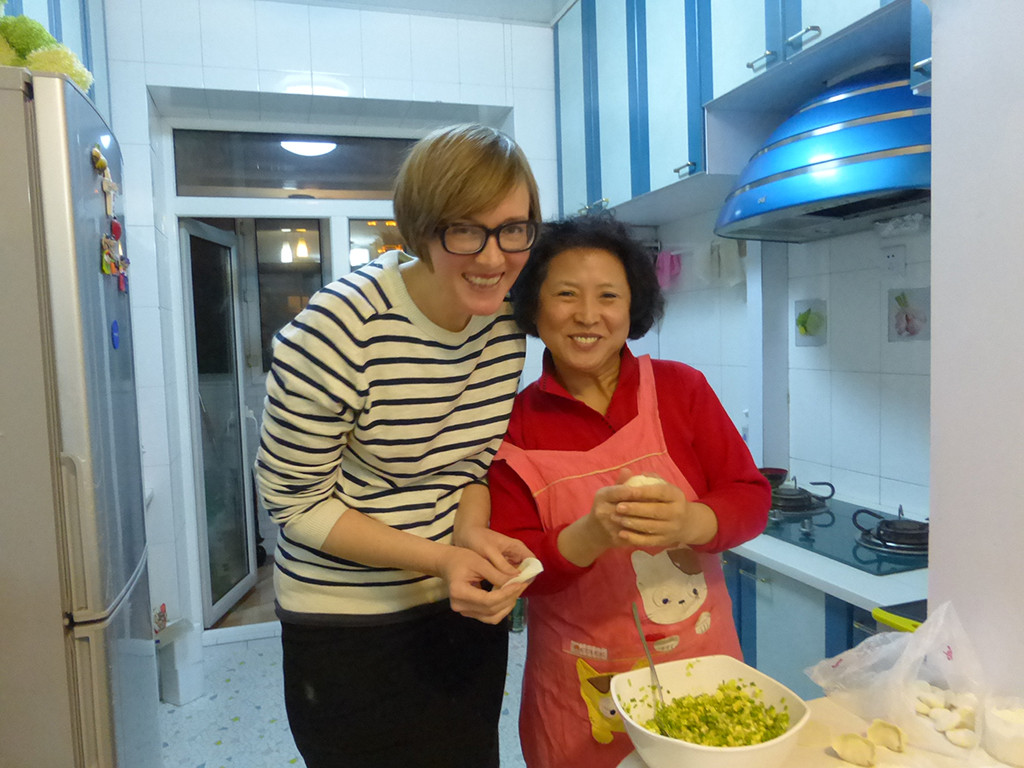When I was in seminary, I was told countless times by professors that I couldn’t and shouldn’t maintain my vegetarian commitment abroad, especially in mission encounters. They insisted that to be polite one needs to eat everything offered. But I’ve been a vegetarian for eighteen years, and even though I’ve lived abroad several times and traveled extensively, I haven’t needed to give up that dietary commitment when connecting with people in other countries. I will share a few of my stories about how cooking and having an interest in food have helped me develop relationships with many Chinese families, demonstrating how my commitment to vegetarianism has resulted in deeper and more authentic encounters.
Short-term mission trips have certainly become more popular. On these brief trips, the visitors are usually hosted royally and treated to grand feasts. There generally isn’t time to develop close relationships with the hosts, so it can be awkward to mention a dietary difference. However, that short-term model is not the kind of mission that I engage in China, where I serve with Mennonite Central Committee and Mennonite Partners in China. When I’m a dinner guest here, the hosts are friends who know me well. Because of our friendship, they already know I’m a vegetarian, and meals have never been awkward. In fact, I’m often told that I’m appreciated as a vegetarian because I’m a cheap guest.
I’ve been teaching at the national seminary here in China for the last three years, and my students are the top theological students in the country, coming from all regions. My Mennonite sending agencies stress the relationship-building aspect of my job as much as my hours in the classroom, and I take this seriously. I’ve built countless close relationships here with the students, many of which have developed through all of the cooking groups and cooking parties that I’ve initiated on campus. Additionally, I travel all over China to visit my students in my free time, usually living in their homes for several days to a week or more. I get to know their parents more closely and learn more deeply about their home church contexts. I’ve already visited a majority of the provinces across this large country.
Many families have told me it was honestly a relief for them to host a vegetarian. It’s so much cheaper for them because they don’t need to fuss over me with lobster, shrimp, fish, and other animal-based delicacies. We eat simple food, often stir-fries with cheap seasonal vegetables. In a way, I feel that this lifestyle actually draws me closer to the families because they’re not cooking special feasts for me but their daily standard fare. While many visitors to China will come away saying most of the food is meat-based, it is because they are eating special dishes, but in most homes locals eat much less meat than a tourist will consume.
Because I love cooking, I always enthusiastically ask host families about local cooking methods. Besides enjoying ourselves, spending time in the kitchen with families also helps break down cultural barriers. Sometimes my students’ parents seem nervous when I arrive, not knowing what to talk to me about, as I am an obvious foreigner being both tall and blond. I think my curiosity about food creates an easy way to connect. My hosts are usually surprised that I have questions about their cooking methods, because to them it’s all so easy and obvious. But China is a large country with several distinct regional cuisines, and even dishes with the same names are cooked differently from town to town. So I always feel I have more to learn, and I’m always curious. My hosts like that.

Once, in southwest China, I spent a week in a student’s home that was so remote and surrounded by mountains that they had only had contact with the outside world for the last twenty years. I was told that I was the first foreigner to visit some of the surrounding villages. Because of the mountainous landscape, at least half of the items at the market were wild vegetables foraged from the steep slopes. My student’s mom told me it was a relief to host me as a vegetarian because not only did she not have to buy expensive meat every day but she could also show off the rich local variety of wild greens. We ate about twenty different wild greens at our meals that week. Most of them didn’t have names—they are simply called “ye cai” or “wild vegetable”—but the locals could tell by sight if the flavor would be sweet, bitter, garlicky, or reminiscent of parsley.

On another trip I stayed in a remote wooden village where I had to fetch drinking water from a spring and wash my hair in a river. My student’s parents had built their wooden home themselves. They asked me to pray at each meal. At the end of my stay, the father remarked that all of my prayers had been about gratefulness, and he was moved that I could be grateful for such simple vegetarian meals in their rustic home.
Last year I spent two weeks in the far northern city of Harbin, residing in a North-Korean Chinese home. There is a sizable Korean community in Harbin, mostly North Koreans who moved there two or three generations ago. My student’s mom and I bonded closely because we spent that time together in the kitchen cooking. She cried when I left and told me that I was like a daughter to her. Over those two weeks she had taught me to cook a mixture of simple and delicious northern Chinese and Korean dishes, and we made vegetarian dumplings together during the Chinese New Year. She also pulled me into her afternoon mahjong group, teaching me to play by local Harbin rules. After several afternoons of playing mahjong with her and her close friends, who were also Chinese-Korean, they opened up to me about the prevalence of domestic violence in Korean culture—the kind of conversation that doesn’t normally happen with outsiders.
Last month in Shanghai while I was making steamed dumplings with my student’s mom, she told me she’s almost a vegetarian—what I would call a “flexitarian” back home in California. She asked me why I became a vegetarian, and I talked about factory farming, which isn’t good for the animals, the earth, or consumers. I explained that most Mennonites aren’t vegetarian but that I want to extend my Anabaptist commitment of nonviolence to include animals and the earth. She told me she visited a farm as a child and that she didn’t like how the animals were treated. Because we had just been talking about Chinese astrology, I knew her age. I asked if she was sent to a farm during the Cultural Revolution, and her husband jumped up, beaming. “Wow! You know Chinese history!” I don’t normally ask people of her generation about the Cultural Revolution, since most don’t even talk about it with their own children. But our conversation about food had opened the door for me to do so, and she shared about working on a farm in Jiangxi Province during that dark period of history. She reminisced for the rest of the evening, concluding that people in China have more now but that their lives are more complicated, and they aren’t necessarily happier.
These are just a few stories of how cooking and an interest in food have helped me connect with many Chinese families. My commitment to vegetarianism has resulted in meaningful conversations and relationships, allowing my hosts to share more deeply about their lives, and me to honor my values and commitments.
Footnotes
Kate Wentland teaches at China’s national seminary in Nanjing, serving with Mennonite
Central Committee and Mennonite Partners in China. Her home church is Peace
Mennonite Fellowship in Claremont, California.